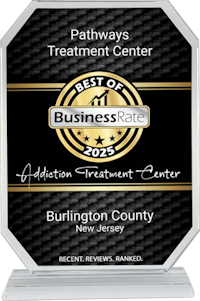Depression and Addiction Recovery in Burlington, New Jersey
Depression and addiction often go hand in hand. At Pathways, we use an integrated approach to treat both conditions, helping you heal emotionally while building a strong foundation in recovery.
Depression and addiction often walk hand in hand, creating a complex web of emotional and physical suffering. At Pathways Treatment Center in Burlington, New Jersey, we understand that many people struggling with addiction also experience depression, which can make recovery even more challenging. Patterns of self-medication with addictive substances can lead to a cycle of addiction that only exacerbates each condition.
At Pathways, we specialize in treating both addiction and depression together, because we know that healing from one issue without addressing the other can make recovery incomplete.
Depression and Addiction Recovery in New Jersey
What is Depression?
Depression is more than just feeling sad or going through a rough patch. While everyone experiences periods of sadness or low energy from time to time, depression is a serious mental health disorder that affects every aspect of a person’s life. It can interfere with relationships, work, and basic day-to-day functioning.
Clinical depression includes a persistent feeling of hopelessness, worthlessness, and deep sadness that can last for weeks, months, or even years if untreated. Depression doesn’t simply “go away” on its own. It requires professional care and support, which is exactly what we offer at Pathways Treatment Center.
Symptoms of Depression
Regardless of the type of depression, certain symptoms are common across the board. Recognizing these symptoms is crucial for seeking help early. Symptoms may include:
- Persistent feelings of sadness or hopelessness
- Loss of interest or pleasure in activities
- Changes in appetite or weight
- Insomnia or excessive sleeping
- Fatigue or loss of energy
- Difficulty concentrating or making decisions
- Feelings of guilt or worthlessness
- Irritability or restlessness
- Physical aches and pains without a clear cause
- Thoughts of death or suicide
At Pathways Treatment Center, we take a comprehensive approach to assessing symptoms, ensuring that individuals receive a tailored treatment plan that addresses both their depression and any co-occurring substance use disorder.
Feeling Depressed vs. Clinical Depression
It’s important to differentiate between temporary feelings of sadness and clinical depression. Life events such as the loss of a loved one, a breakup, or financial difficulties can cause someone to feel down for a period. These bouts of sadness may fade as time goes on or as circumstances change.
However, clinical depression is a more enduring condition, often caused by a mix of genetic, biological, environmental, and psychological factors. It isn’t tied to any specific event and may occur even when everything in life seems to be going well. This is what distinguishes clinical depression from bouts of sadness or grief.
Depression and Addiction Recovery in New Jersey
Types of Depression Disorders
Depression comes in different forms, and each type has unique symptoms and challenges. Understanding these types can help in recognizing the specific struggles you or a loved one may be facing.

Major Depressive Disorder is characterized by persistent feelings of sadness, hopelessness, and a lack of interest in activities you used to enjoy. People with MDD may struggle with sleeping, eating, concentrating, and may have thoughts of suicide. These symptoms can last for weeks or months at a time, significantly impairing a person’s ability to function.
PDD, also known as dysthymia, is a chronic form of depression that lasts for at least two years. While the symptoms may not be as intense as those of MDD, they persist over a longer period and lead to a low mood that can feel like it’s “just part of life.” People with PDD may feel like they’ve always been this way and can lose hope that things will improve.
While bipolar disorder is primarily associated with mood swings between manic (high-energy) and depressive states, the depressive episodes in this condition can be just as severe as those in MDD. During these depressive phases, individuals often experience low energy, sadness, and a lack of motivation. This can make it hard to maintain consistency in daily life, and when paired with addiction, the consequences can be even more destructive.
SAD occurs during certain seasons, typically in the winter months when daylight hours are shorter. Individuals with SAD may experience symptoms of depression during this time of year, such as low energy, difficulty concentrating, and feelings of hopelessness. The seasonal nature of this disorder can make it predictable but no less difficult to manage, especially when combined with substance use.
Postpartum depression affects new mothers, typically within the first year after childbirth. This form of depression can include severe mood swings, exhaustion, and feelings of worthlessness. While it’s a highly specific type of depression, it can overlap with substance use, particularly when someone turns to alcohol or drugs to cope with overwhelming emotions.
Depression and Addiction Recovery in New Jersey
How Do Depression and Addiction Co-Occur?
Depression and addiction are deeply intertwined, creating a cycle that can be hard to break without professional help. It’s common for people suffering from depression to turn to addictive substances as a way to self-medicate. They may believe that these substances will help them cope with the overwhelming feelings of sadness, anxiety, or emptiness.
Unfortunately, while drugs or alcohol may offer temporary relief, they often make depression worse in the long run. Substance use disrupts the brain’s chemistry, leading to deeper mood swings, increased feelings of hopelessness, and physical dependency. Over time, addiction can further isolate an individual, exacerbating feelings of loneliness and depression.
Likewise, addiction itself can trigger depression. The physical and psychological toll of substance abuse, combined with the negative consequences that come with it (such as damaged relationships, job loss, or legal troubles) can create a downward spiral into depression.
It’s important to understand that treating one condition without addressing the other often leads to relapse. That’s why we offer dual diagnosis treatment in Burlington, New Jersey that’s designed to simultaneously treat both depression and addiction.
Depression and Addiction Recovery in New Jersey
The Cycle of Self-Medication and How It Contributes to Depression and Addiction
One of the reasons depression and addiction are so closely linked is the cycle of self-medication. People with depression often feel desperate to escape their emotional pain, leading them to experiment with drugs or alcohol. While substances may provide short-term relief, they eventually lead to increased tolerance, withdrawal symptoms, and a worsening of depressive symptoms. This can lead to even more substance use, creating a destructive cycle that is difficult to escape without intervention.
We help our clients break this cycle by providing a combination of therapeutic interventions, coping strategies, and, when necessary, medication-assisted treatment to support recovery.

Depression and Addiction Recovery in New Jersey
Heal from Depression and Addiction at Pathways Treatment Center
At Pathways Treatment Center, we offer specialized dual diagnosis treatment for individuals dealing with both addiction and depression. We understand that healing from these co-occurring disorders requires an integrated approach that accounts for mental illness’s role in relapse prevention. Our outpatient program allows clients to receive the care they need while continuing to manage their daily responsibilities.
Our Approach to Dual Diagnosis Treatment
Our treatment process begins with a thorough evaluation to understand the unique challenges each client faces. We assess the severity of both the addiction and any underlying mental health issues to create a customized treatment plan. We use evidence-based addiction therapy modalities such as Cognitive Behavioral Therapy (CBT), Dialectical Behavior Therapy (DBT), and motivational interviewing to address the emotional, psychological, and behavioral aspects of both conditions.
Therapy and Counseling
Therapy is a cornerstone of our dual diagnosis treatment at Pathways. Through individual counseling, clients explore the root causes of their depression and addiction, gaining insight into how these issues are interconnected. Group therapy provides a supportive space for individuals to connect with others who are experiencing similar struggles, fostering a sense of community and shared understanding.
Medication Management
In some cases, medication-assisted treatment may be necessary to manage symptoms of depression or to help with the withdrawal process from substances. Our team of medical professionals carefully evaluates each client’s needs to determine whether medication-assisted treatment is appropriate. This approach is always combined with therapeutic interventions to ensure a holistic path to recovery.
Building Healthy Coping Mechanisms
At Pathways, we focus on helping clients develop healthier ways to cope with life’s challenges. This includes teaching mindfulness techniques, stress management strategies, and other tools to handle the emotional ups and downs that come with both depression and addiction. By building resilience and emotional regulation skills, we empower our clients to navigate their recovery journey with confidence.
Depression and Addiction Recovery in New Jersey
Why Choose Pathways Treatment Center?
At Pathways, we pride ourselves on offering a compassionate, personalized approach to dual diagnosis treatment. We know that each person’s journey is unique, and we’re here to guide you every step of the way. Our goal is to help individuals reclaim their lives from the grip of depression and addiction, providing the tools and support necessary for long-term recovery.
If you or a loved one is struggling with both depression and addiction, don’t wait to seek help. Reach out to Pathways Treatment Center today to start building a brighter, healthier future.



